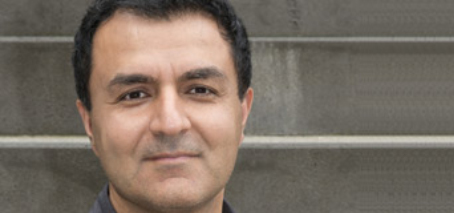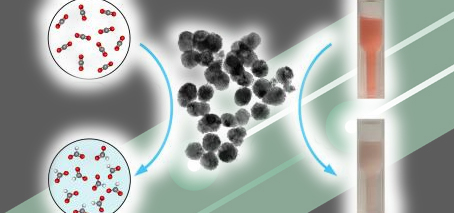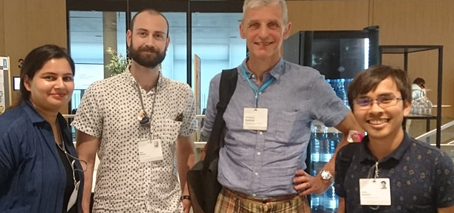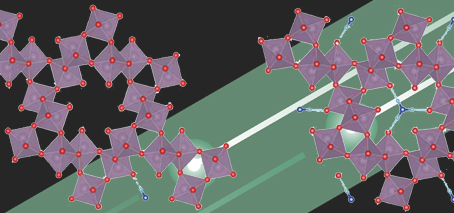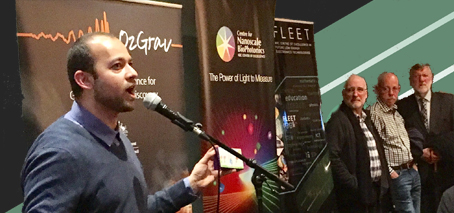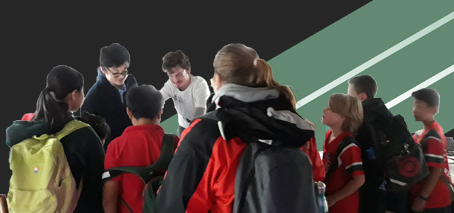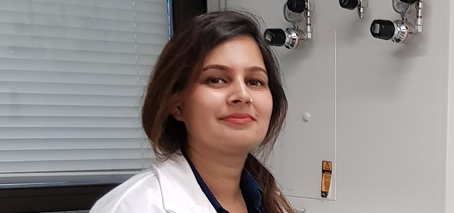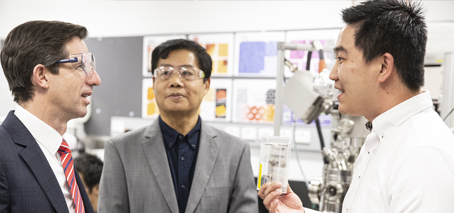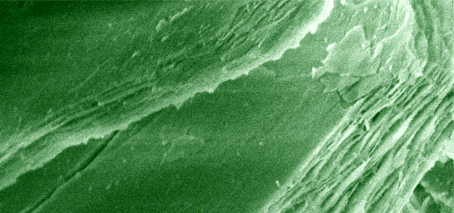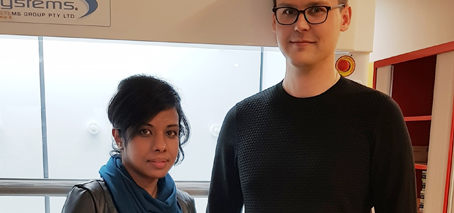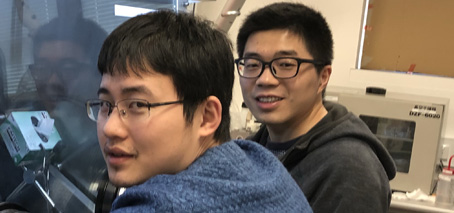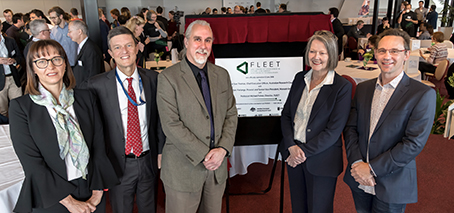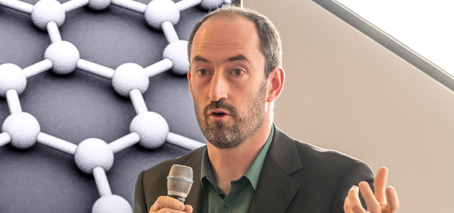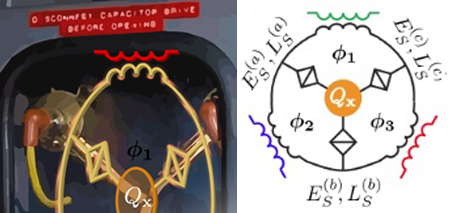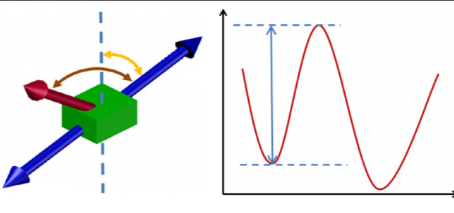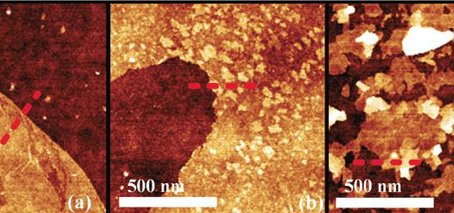Welcoming new FLEET committee Chairs: Jeff Davis (Swinburne University of Technology) Equity and Diversity Committee Meera Parish (Monash Science) Outreach Jared Cole (RMIT University) Education and Training Torben Daeneke (RMIT) Industry relations David Cortie (University of Wollongong) Communications Thanks in particular to AIs Torben Daeneke and David Cortie for taking on these extra responsibilities. And huge thanks to the outgoing …
Kourosh recognised
FLEET’s Kourosh Kalantar-zadeh (UNSW/RMIT) has been awarded the 2019 Walter Burfitt Prize by the Royal Society of NSW, recognising Kourosh’s excellent research in liquid metals, atomically thin materials and ingestible sensors. The Walter Burfitt Prize is awarded every three years for research in pure or applied science deemed of the highest scientific merit. This year’s Royal Society prize recognises Professor Kalantar-Zadeh’s …
Developing future scientific leaders
FLEET tops up external funding to build leadership skills Two of FLEET’s six strategic priorities are developing the next generation of science leaders, and fostering equity and diversity in STEM. Establishing career support initiatives for women in FLEET is an important milestone towards achieving each of these goals. FLEET will provide an environment for our early-career women to thrive and …
Clarivate highly-cited researchers
Congratulations to FLEET Chief Investigators: Kourosh Kalantar-zadeh (UNSW and RMIT) in chemistry, engineering, material science and medical devices Qiaoliang Bao (Monash University) in 2D materials science, graphene, photonics, optoelectronics and optical comms The Clarivate Analytics list identifies researchers ranking in the top 1% by citations for their field. The citation identifies influential researchers as determined by their peers around the …
Welcome Mingliang Tian (CAS): new FLEET PI
FLEET extends a warm welcome to Professor Mingliang Tian, who joins the Centre as a new Partner Investigator. Professor Tian is vice-director of the Chinese Academy of Science’s High Magnetic Field Laboratory in Anhui province, China, which becomes a new partner organisation for FLEET. At the CAS, Professor Tian’s group studies on low-dimensional electronic systems and artificial nanostructures such as …
Liquid metals the secret ingredients to clean up environment
Forget the laboratory, substances that can solve environmental problems by capturing carbon dioxide, decontaminating water and cleaning up pollutants can be easily created in a kitchen, a UNSW Sydney study shows. In a paper published today in Nature Communications, UNSW chemical engineers shone a light on the mysterious world of liquid metals and their role as catalysts to speed up chemical …
Lindau report
Three FLEET ECRs were fortunate to attend the 69th Nobel laureate meeting in Lindau, Germany, forming an impressive 30% of Australia’s ten-person delegation elected and led by the Australian Academy of Science. This year’s meeting focused on physics, and a number of senior FLEET were amongst the laureates. Our ECRs were pleased to connect with Wolfgang Ketterle, William Phillips, and …
Collaboration unlocks new magnetic properties for future, faster, low-energy spintronics
• RMIT–UNSW collaboration combines theory, experimental expertise • ‘Spintronic’ applications promise faster, more efficient computing • New magnetic properties of 2D Fe3GeTe2 (FGT) discovered A theoretical–experimental collaboration across two FLEET nodes has discovered new magnetic properties within 2D structures, with exciting potential for researchers in the emerging field of ‘spintronics’. Spintronic devices use a quantum property known as ‘spin’, in …
Meet molybdenum, an acid-free route to future Hydrogen power?
Molybdenum based compounds could provide key to hydrogen production for future zero-emissions energy RMIT/Monash collaboration opens promising route towards alkaline hydrogen production A FLEET study combining experimental expertise at RMIT with theoretical modelling at Monash University opens a new route towards efficient, cost-effective production of hydrogen. Researchers discovered that ammonium-doped, hexagonal molybdenum oxide (MoO3) displays extremely promising electronic and material …
COEs partner up for pitch training and physics on-stage
Three events last week allowed FLEET members to develop valuable, transferable communications and outreach skills, as well as providing a chance for FLEET to strengthen links with other ARC Centres of Excellence. A pitch training session for researchers from three ARC Centres introduced key communications concepts such as choosing the most effective lead, tailoring the pitch to the audience, presenting …
Flying the future-computing flag at Melbourne Knowledge Week
Over a dozen FLEET researchers flew the flag for FLEET and future computing at the recent Melbourne Knowledge Week showcase. Reps introduced the public to ICT energy use, electromagnetism, superconductivity (via FLEET’s supercooled Mobius track) , and the mechanics of binary operations that underlie all modern computing, via the Centre’s two Digicomputers. The superconducting track and Mobius track proved the …
New Josephson junction study links quantum theory to experiment
The Josephson junction is one of the most important elements in turning quantum phenomena into usable technology. A new RMIT study establishes a theoretical framework for new optical experimentation on these key devices, with implications for future fundamental quantum research and applications such as quantum computing. Josephson junction studies Josephson junctions can be formed by two superconducting plates, separated by …
Welcome new FLEET crew members
We have recently welcomed a number of new Centre members, including: New PhD students (in most cases, having decided to continue with us after their FLEET Honours projects): Bernard Field with Agustin Schiffrin (Monash) Oliver Stockdale with Matt Davis (UQ) Yik-Kheng Lee with Jared Cole (RMIT) Zeb Krix with Oleg Sushkov (UNSW) Mitchell Conway with Jeff Davis (Swinburne) Lina Sang with Xiaolin Wang (UOW) New …
Three young FLEET scientists off to Lindau Nobel meeting
Three FLEET researchers have been chosen to represent Australia at the annual Lindau Nobel Laureate Meeting this year. The three FLEET researchers will among ten early-career Australian scientists attending the 69th Meeting of Nobel Laureates in Lindau, Germany, 30 June – 5 July 2019. The 69th Lindau Nobel Laureate Meeting will be dedicated to physics. To date, 42 Nobel Laureates have …
Climate rewind: Scientists turn carbon dioxide back into coal
Researchers have used liquid metals to turn carbon dioxide back into solid coal, in a world-first breakthrough that could transform our approach to carbon capture and storage. The research team led by RMIT University in Melbourne, Australia, have developed a new technique that can efficiently convert CO2 from a gas into solid particles of carbon. Published in the journal Nature …
Live-streamed FLEET seminars
In 2018 FLEET began a series of live-streamed seminars to help share research results across the Centre, keep members informed on latest FLEET research, and enhance inter-node collaboration. Early-career researchers presenting the seminars gain valuable presentation experience, and benefit from feedback on their research from diverse Centre members. These seminars also provide an opportunity for regular get-togethers in each node, …
Engaging with policymakers in 2018
Education Minister Simon Birmingham and ARC CEO Sue Thomas visited FLEET labs in may this year at the University of Wollongong’s (UOW’s) Innovation Campus. UOW node leader Prof Xiaolin Wang, Centre Deputy Director Prof Alex Hamilton (UNSW) and UOW researchers gave the Minister a quick introduction to ICT energy-use issues, topological insulators and atomically-thin materials, including a tour of labs …
Three FLEET researchers in Clarivate highly-cited researchers list for 2018
Congratulations to: Michael Fuhrer (Monash University) in the fields of Materials Science; Physics Kourosh Kalantar-zadeh (UNSW and RMIT) in Chemistry; Engineering Qiaoliang Bao (Monash University) in Materials Science; Optics; Physics. The Clarivate Analytics list identifies researchers ranking in the top 1% by citations for their field. Now in its fifth year, the citation identifies influential researchers as determined by their …
Physicists tour FLEET-RMIT
FLEET’s RMIT labs recently hosted a tour by members of the Victorian branch of the Australian Institute of Physics, the country’s leading body for physics advocacy and support. The tour included the experimental laboratories and a briefing by RMIT node leader Prof Lan Wang, and AI Torben Daeneke, covering the research topics in Lan Wang’s group, Jared Cole’s group, JianZhen …
Congratulations Jared Cole CI
Congratulations to RMIT Professor Jared Cole, now a FLEET Chief Investigator. Jared is a theoretical physicist specialising in quantum physics and decoherence theory, particularly its application to solid-state systems. Within FLEET Jared investigates the influence of dissipation and decoherence on electronic transport in nanostructures, and its role in electronic devices based on topologically protected conduction channels. This is key to …
Quick and not-so-dirty: a rapid nano-filter for clean water
FLEET researchers have designed a rapid nano-filter that can clean dirty water over 100 times faster than current technology. Simple to make and simple to scale up, the technology harnesses naturally occurring nano-structures of aluminium hydroxide that grow on liquid metal gallium. The researchers behind the innovation at RMIT University and UNSW have shown it can filter both heavy metals …
Pushing ‘print’ on large-scale piezoelectric materials
First ever large-scale 2D surface deposition of piezoelectric material Simple, inexpensive technique opens new fields for piezo-sensors & energy harvesting Researchers have developed a revolutionary method to ‘print’ large-scale sheets of two dimensional piezoelectric material, opening new opportunities for piezo-sensors and energy harvesting. Importantly, the inexpensive process allows the integration of piezoelectric components directly onto silicon chips. Until now, no …
Congratulations Kourosh Kalantar-Zadeh, ARC Laureate Fellow
Congratulations to FLEET’s Kourosh Kalantar-Zadeh — named an Australian Research Council Laureate Fellow today. Kourosh’s significant influences in engineering include two-dimensional (2D) transition metal compounds, liquid metals, microfluidics, sensors, electronic devices and medical systems. He is an expert in chemical and biochemical sensors, nanotechnology, microsystems, materials science, electronics, gastroenterology, medical devices and microfluidics, and has made internationally-recognised contributions to the …
Centre collaboration combines material expertise
FLEET RMIT—UNSW collaboration measuring transport properties of van der Waals heterostructures FLEET PhD Cheng Tan (RMIT) visited UNSW’s labs in May to perform magnetic coupling measurements on 2D ferromagnetic crystals. The visit was reciprocated this month with FLEET Research Fellow Feixiang Xiang (UNSW) visiting RMIT to construct van der Waals structures for studying of 2D topological systems. This collaboration between …
Launch of FLEET Centre of Excellence to tackle hidden energy costs of computing
Official launch: Australian Research Council Centre of Excellence in Future Low-Energy Electronics Technologies 12 June 2018, 11 AM New Horizons Building, Monash University, Clayton We have an insatiable appetite for computing. But our ongoing need for computation is burning more than 5 percent of global electricity. And that figure is expected to double each decade. A new Australian Research Council …
The innovative science behind FLEET: Jared Cole at the Centre Launch
When using an electronic device to watch tv, listen to music, model the weather or any other task that requires information to be processes, there are millions and millions of binary calculations going on in the background. There are zeros and ones being flipped, added, multiplied and divided at incredible speeds. The fact that a microprocessor can perform these calculations …
Physicists invent flux capacitor, break time-reversal symmetry
In the popular movie franchise “Back to the Future”, an eccentric scientist creates a time machine that runs on a flux capacitor. Now a group of actual physicists from Australia and Switzerland have proposed a device which uses the quantum tunneling of magnetic flux around a capacitor, breaking time-reversal symmetry. The research, published this week in Physical Review Letters, proposes …
Thinner is better: van der Waals (vdW) material shows the right stuff at 200 nanometres
The unusual electronic and magnetic properties of van der Waals (vdW) materials, made up of many ‘stacked’ 2D layers, offer potential for future electronics, including spintronics. In a recent study, FLEET researchers at RMIT found that one promising candidate material, Fe3GeTe2 (FGT), fits the bill – provided it’s created in layers only 200 millionths of a millimetre in thickness. This …
Rebecca Orrell-Trigg (RMIT) interview re liquid metal and 2D materials, RRR
FLEET PhD student Rebecca Orrell-Trigg (RMIT) uses liquid metals to synthesise 2D (atomically thin) materials for use in future ultra-low energy electronic devices. Late last year they developed a liquid metal “bubbling” method that was described as “ground breaking”, and have since refined this method to make it even more widely applicable. Rebecca’s interview covered the advantages of the new …
Characterising tin-oxide growth: improved understanding of ground-breaking liquid-metal 2D technique
Last year, FLEET researchers at RMIT developed a ground-breaking new method of depositing atomically-thin (two-dimensional) crystals using molten metals, described as a ‘once-in-a-decade’ advance. Earlier this year, the same research team expanded the new method from controlled to ambient conditions, and has properly characterised the growth mechanisms for key tin oxides, which should allow improved control of target oxide growth. …


